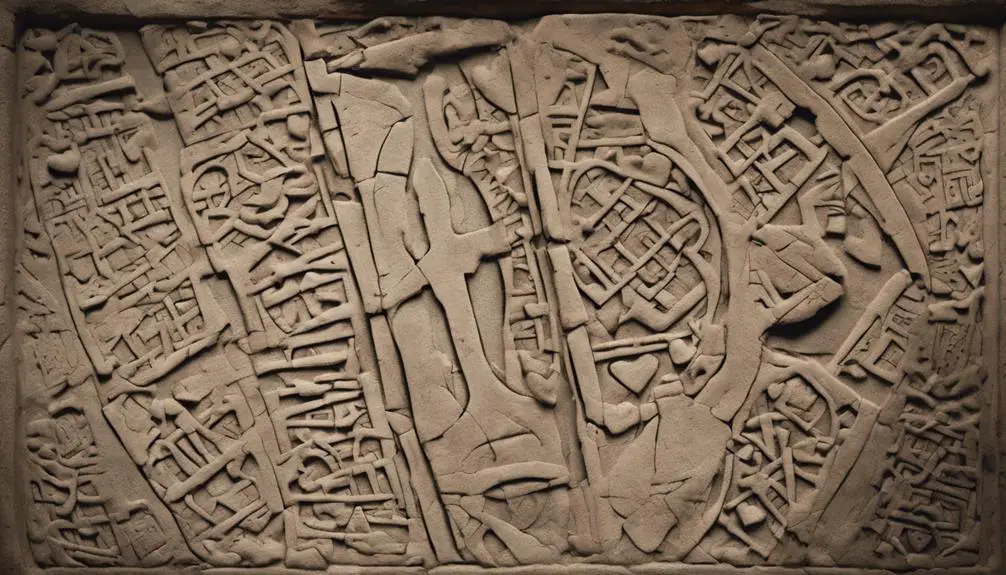An intriguing journey through biblical teachings, the '15 Abomination List' reveals timeless lessons on ethics and morality, inviting reflection on modern parallels.

15 Abomination List in the Bible
Did you know that the Bible references the term 'abomination' over 150 times? It's a concept that spans from idolatry to dishonesty, encapsulating behaviors that are deeply frowned upon.
As you explore the list of 15 abominations, you'll find that they touch on aspects of life as diverse as ethics, morality, and social justice. This exploration isn't just about uncovering ancient prohibitions; it's about understanding the underlying principles that remain relevant today.
You might find yourself surprised at how these ancient texts mirror contemporary issues, inviting a deeper reflection on personal and societal values.
Key Takeaways
- The Bible strongly condemns idolatry, emphasizing the rejection of false gods and excessive materialism.
- Disrespecting parents is viewed as a severe violation that threatens the foundational unit of society.
- Lying and deceit are highlighted as destructive to trust and relationships, undermining societal justice.
- Sexual immorality, including adultery, is deemed a serious offense against divine and moral law.
Idolatry and False Gods

Throughout the biblical narrative, idolatry and the worship of false gods emerge as recurrent themes, deeply opposed by the monotheistic ethos central to the text. You'll notice that the scripture frequently denounces the practice, associating it with a profound moral and spiritual decline. This condemnation reflects not merely a rejection of polytheism but also an assertion of a covenant between the divine and humanity, predicated upon exclusive worship and moral integrity.
In examining modern idolatry, it's crucial to recognize that while the explicit worship of statues and deities may have diminished, the essence of idolatry—placing undue value or reverence in entities other than the divine—persists. Today, cultural gods don't necessarily reside in temples or shrines but manifest through excessive devotion to materialism, power, status, and even technology. These entities, though not deities in the traditional sense, command attention, time, and resources, often diverting individuals from their spiritual and ethical commitments.
The biblical injunction against idolatry, therefore, extends into the contemporary era, challenging individuals to scrutinize the 'cultural gods' they may unknowingly worship. This analysis isn't merely academic but invites a reflective assessment of priorities, values, and the allocation of one's life resources. The enduring relevance of the biblical prohibition against idolatry lies in its call to recognize and resist the subtle seductions of modern idolatry, advocating for a life centered around values that transcend the immediate allure of cultural gods.
In this light, the biblical critique of idolatry and false gods resonates with pressing modern concerns, urging a reevaluation of what truly merits reverence and devotion.
Dishonoring Parents

Just as idolatry challenges the spiritual integrity of communities, dishonoring parents undermines the fundamental societal bonds that scripture seeks to preserve. Within the biblical framework, parental respect isn't merely a cultural norm but a divine commandment. This principle is deeply embedded in the fabric of scriptural teachings, reflecting the importance of family cohesion and respect for authority. The act of dishonoring parents, therefore, isn't just a personal misstep; it's viewed as a transgression against the societal and divine order.
The consequences of failing to uphold parental respect are multifaceted. On a societal level, it leads to a breakdown in the essential communication channels between generations. This breakdown not only erodes the familial bond but also weakens the community's moral foundation. When children fail to honor their parents, they're not only disobeying a direct biblical command but also fostering an environment where disrespect and discord can flourish.
Moreover, the biblical texts suggest that dishonoring parents is symptomatic of a larger communication breakdown within the family unit. This breakdown impedes the transmission of values, wisdom, and traditions that are crucial for maintaining social stability and continuity. The scriptures, by condemning this act, underscore the importance of nurturing a culture of respect and dialogue within families.
In essence, the abomination of dishonoring parents serves as a warning against the dangers of fracturing the most basic unit of society—the family. By advocating for parental respect, scripture aims to preserve not only the sanctity of the family but also the moral and spiritual health of the community at large.
Lying and Deceit

In the realm of biblical teachings, lying and deceit stand as profound betrayals of the trust foundational to both divine and human relationships. These actions, condemned throughout scripture, highlight the importance of truthfulness and the adverse truth consequences and fabrication impacts on societal and personal levels.
Biblical Reference |
Condemnation of Deceit |
|---|---|
Proverbs 6:16-19 |
Lists lying as an abomination |
Ephesians 4:25 |
Urges truthfulness among believers |
Colossians 3:9 |
Warns against lying to one another |
Revelation 21:8 |
Associates lying with eternal damnation |
Analyzing these references, one observes a clear pattern: deceit is not merely discouraged but presented as fundamentally incompatible with the character of a faithful person. The fabrications and falsehoods that people might engage in disrupt the fabric of trust, leading to erosion of relationships, communities, and one's relationship with the divine. The emphasis on truthfulness underscores the belief that integrity in word and action forms the cornerstone of a just society and a life pleasing to God.
The consequences of deceit extend beyond immediate relational fallout, touching on the moral and spiritual development of individuals. Scripture posits that habitual deceit distances one from divine truth and guidance, leading to spiritual impoverishment. This underscores the gravity of fabrication impacts, which can lead to a life marked by alienation from both community and the divine.
Thus, in the biblical context, lying and deceit are not merely social faux pas but violations of divine commandments, with far-reaching implications for one's spiritual and communal well-being.
Adultery and Sexual Immorality

Turning to the subject of adultery and sexual immorality, the Bible treats these acts as severe violations of moral and divine law. Marital fidelity and sexual purity stand as foundational elements within the scriptural texts, emphasizing the sanctity of the marriage covenant and the importance of maintaining purity both within and outside of marriage. The emphasis on these principles isn't merely about following a set of prohibitions but is deeply rooted in the creation narratives, where the union between a man and a woman is established as a reflection of divine order and intention.
The biblical narrative is replete with instances and laws that underline the seriousness of adultery and sexual immorality. For example, the commandment 'You shan't commit adultery' is straightforward in its condemnation of extramarital relations, positioning such behavior not only as a betrayal of human trust but also as an affront to the covenantal relationship established by God. This perspective is reinforced by the prophetic literature, where spiritual unfaithfulness is often depicted through the metaphor of adultery, further illustrating the depth of betrayal represented by infidelity.
Moreover, the New Testament continues this emphasis on sexual purity, extending the concept to include not just physical acts but also the intentions and thoughts that precede them. This broadened understanding underscores the comprehensive nature of biblical ethics concerning sexuality, where the focus transcends actions to encompass the entirety of human moral and spiritual integrity.
Homosexual Acts

When exploring the biblical stance on homosexual acts, it's imperative to examine the texts with both historical context and theological depth. The Bible, particularly in Leviticus and Romans, references homosexual behavior, but modern interpretations often grapple with understanding these passages within their cultural context. It's crucial to recognize that the ancient societies from which these texts emerged had vastly different social structures and norms than today.
In Leviticus, homosexual acts are labeled as an abomination, a term that carries strong condemnation. However, scholars argue that the cultural context of these ancient texts significantly influences their interpretation. The societal norms and beliefs of the time played a pivotal role in shaping the biblical authors' perspectives. Thus, understanding the historical background is essential for a more nuanced interpretation.
Modern interpretations of these passages vary widely. Some argue that the biblical texts specifically condemn the exploitative and idolatrous aspects of same-sex relations observed in ancient times, rather than a consensual, loving relationship between same-sex individuals. Others maintain a traditional interpretation, viewing any homosexual act as contrary to biblical teachings.
Analyzing these divergent viewpoints requires a careful consideration of both the original Hebrew and Greek texts and the broader cultural and historical context. The debate over how to interpret these passages reflects the complexities of applying ancient texts to contemporary ethical discussions. As such, engaging with a range of scholarly perspectives is crucial for anyone seeking to understand the biblical stance on homosexual acts within the framework of modern theology and ethics.
Offering Children to Molech

Another abomination addressed in the Bible involves the offering of children to Molech, a practice vehemently condemned within the scriptural texts. This form of child sacrifice history is deeply rooted in ancient Near Eastern cultures, where Molech worship origins trace back to. The deity Molech, often associated with fire and fertility, demanded extreme forms of reverence and sacrifice, the most abhorrent of which was the offering of one's own children.
The Bible's depiction of this practice serves as a stark warning against idolatry and the lengths to which it could corrupt morally and spiritually. Leviticus 18:21 explicitly prohibits giving any of one's offspring to Molech, framing it not just as a sin but as an abomination—a violation of natural and divine law. The texts reveal a profound concern for the sanctity of life and the protection of the innocent, emphasizing the community's responsibility to safeguard the most vulnerable.
Analyzing this condemnation, it's clear that the biblical authors sought to differentiate the ethical and spiritual values of their community from those of surrounding nations. The prohibition against child sacrifice to Molech symbolizes a broader denouncement of practices that devalue life and dignity. It underscores a fundamental biblical principle: the inherent worth of every individual, regardless of age or status.
In the broader context of child sacrifice history, the biblical repudiation of offering children to Molech not only highlights the moral aberrations of ancient rites but also serves as a timeless reminder of the dangers of idolatry and the ethical imperatives that govern human conduct.
Witchcraft and Sorcery

Just as the Bible vehemently condemns the offering of children to Molech, it similarly expresses strong disapproval of witchcraft and sorcery, practices rooted in manipulation and defiance of divine will. These acts, often viewed through a lens of seeking power outside the authority of God, are labeled as abominations, marking a clear boundary between acceptable religious practices and those considered dangerous and forbidden.
To understand the biblical stance on witchcraft and sorcery, consider the following points:
- Historical Context: Originally, these practices were associated with pagan religions, seen as direct challenges to the monotheistic beliefs of the Israelites.
- Scriptural References: Passages in both the Old and New Testaments explicitly condemn these practices, linking them to spiritual rebellion and moral decay.
- Cultural Interpretations: Over time, the understanding and categorization of what constitutes witchcraft and sorcery have evolved, influenced by cultural, theological, and societal shifts.
- Modern Perceptions: Today, the perception of these practices varies widely, from remnants of superstition to elements of contemporary spiritual movements.
- Divine Authority: Central to the biblical condemnation is the notion of usurping or challenging divine authority, a theme that resonates through various prohibitions listed in scripture.
Analyzing the biblical perspective on witchcraft and sorcery offers insights into how these practices were understood within their historical and cultural contexts. It also highlights the enduring tension between established religious norms and the human inclination towards exploring alternative spiritual paths. This exploration not only sheds light on ancient religious attitudes but also encourages reflection on modern perceptions and the ongoing dialogue between faith, tradition, and personal belief systems.
Theft and Dishonesty

In examining the biblical perspective on theft and dishonesty, it's clear that these actions are unequivocally condemned as they undermine the foundational principles of trust and integrity within a community. The Scriptures are replete with admonitions against such behaviors, emphasizing their destructive impact not only on individuals but on the societal fabric as a whole.
Theft, in its various forms, including environmental exploitation, is addressed with severity. The plundering of the earth's resources for personal gain reflects a profound disrespect for the creation that has been entrusted to humanity's stewardship. This form of theft isn't merely about the illegal taking of physical items but extends to the degradation of natural habitats and ecosystems for financial greed. The Bible's teachings suggest that such actions not only violate the commandment against stealing but also betray a lack of reverence for life and the Creator.
Dishonesty, closely related to theft, encompasses a range of deceitful practices aimed at manipulating truths for selfish ends. This includes lying, cheating, and other forms of deception that erode trust and honesty, essential pillars for healthy relationships and societies. The biblical narrative consistently promotes a life of transparency and truthfulness, warning against the temptations of financial greed and the allure of unjust gain.
The scriptural stance on these issues serves as a timeless reminder of the importance of upholding ethical standards and moral integrity. By rejecting theft and dishonesty, individuals and communities affirm their commitment to justice, fairness, and respect for all of creation.
Murder and Violence

While theft and dishonesty corrode the moral fabric of society from within, murder and violence represent a more direct and brutal assault on the sanctity of life, challenging the biblical injunctions that govern human interactions. The Bible, across various passages, condemns acts of murder and violence, underscoring their abominable nature in the eyes of the divine. This stance not only reflects a moral and ethical boundary but also a theological understanding of life's sanctity.
The biblical narrative is replete with directives and stories that illustrate the consequences of breaching the sanctity of life through murder and violence. These acts are viewed not merely as offenses against individuals but as transgressions against the community and God. The following points elucidate the Bible's stance:
- Prohibition of Murder: Commandments explicitly forbid murder, categorizing it as a heinous sin.
- Consequences for Violence: Biblical law prescribes severe penalties for acts of violence, highlighting their gravity.
- War Ethics: Even in the context of war, the Bible sets forth principles that restrict indiscriminate violence, favoring strategies that minimize harm to civilians.
- Revenge Justification: While some texts recount tales of vengeance, they often serve to illustrate the cycle of violence rather than justify revenge.
- Divine Judgment: Stories of divine retribution for acts of violence serve as cautionary tales, emphasizing that justice ultimately lies with God.
Analyzing these aspects, it's evident that murder and violence are starkly condemned within the biblical text, reflecting both a moral aversion and a theological stance on the value of life.
Eating Forbidden Foods

The Bible delineates specific dietary laws, considering the consumption of certain foods as abominations to the faithful. These prohibitions, deeply rooted in ancient cultural practices, serve not only as spiritual directives but also reflect considerations of health implications inherent to the times. You'll find these directives primarily in the books of Leviticus and Deuteronomy, where they categorize a variety of animals as unfit for consumption, including pork, shellfish, and certain birds.
Analyzing these dietary laws through a scholarly lens reveals a complex interplay between spirituality, health, and culture. For instance, many of the forbidden foods are prone to spoilage or carry diseases under the conditions of ancient food preservation and cooking methods. Therefore, the biblical prohibitions could have served a practical purpose in safeguarding the community's health.
Moreover, adherence to these dietary laws reinforced a sense of identity and distinction among the faithful, setting them apart from surrounding cultures with different eating habits. This distinction underscored a spiritual commitment, but it also solidified social cohesion and continuity through shared cultural practices.
In contemporary times, the interpretation and observance of these dietary laws vary widely among different religious communities. Some see them as literal and unchanging commands from God, while others interpret them in light of modern health knowledge and cultural contexts. Regardless of these varying perspectives, the biblical prohibitions on eating certain foods continue to influence dietary habits, cultural practices, and spiritual life, illustrating the enduring impact of ancient texts on modern lives.
Wearing Mixed Fabrics

Shifting focus from dietary laws, another aspect of biblical directives concerns the prohibition against wearing mixed fabrics, reflecting complex considerations of purity, identity, and morality. This rule, found in Leviticus, has sparked considerable debate regarding its implications and relevance in both historical and contemporary contexts. The ban on blending different types of threads, such as wool and linen, is deeply rooted in fabric history and carries significant symbolic weight.
Analyzing this directive requires understanding its place within the broader tapestry of biblical teachings:
- Historical Context: Initially, this prohibition might've served to distinguish the Israelites from neighboring groups, reinforcing a sense of community and separateness.
- Symbolic Meaning: The mixing of fabrics could symbolize the blending of moral and spiritual impurities, aligning with the broader biblical theme of maintaining purity.
- Fabric History: This commandment underscores the evolution of textile production and the significance of materials in ancient societies.
- Modern Applications: Today, the rule invites discussions on the relevance of ancient laws in contemporary faith practices, challenging believers to interpret its significance in modern life.
- Ethical Considerations: Beyond religious observance, this directive prompts reflection on ethical consumption and the environmental impact of textile production.
In dissecting this biblical injunction, it's crucial to navigate the intricate interplay between ancient customs and their potential applications today. The prohibition against wearing mixed fabrics serves as a fascinating case study in how religious texts can influence material culture, ethical considerations, and community identity, bridging past and present in the ongoing dialogue between faith and daily life.
Dishonest Weights and Measures

Another aspect of biblical mandates that demands scrutiny is the prohibition against dishonest weights and measures, a directive that underscores the importance of fairness and integrity in transactions. This prohibition isn't merely a historical curiosity; it holds profound implications for market fairness and consumer trust, even today. By explicitly condemning the use of dishonest scales, the biblical texts advocate for an equitable economic environment where transactions aren't tainted by deceit.
The emphasis on honest measures goes beyond the simple act of fairness; it serves as a foundational principle for building and maintaining consumer trust. In ancient times, as now, trust was paramount in commerce. If consumers can't rely on the integrity of merchants, the entire marketplace suffers. Transactions become fraught with suspicion, and the efficiency of the market declines as buyers spend time and resources verifying the fairness of transactions.
This biblical injunction against dishonest weights and measures also reflects a broader ethical stance on the part of the community and its leaders. It's a call to uphold justice in all dealings, recognizing that the health of the community depends on the integrity of its members. In this light, the prohibition isn't merely a rule but a principle that fosters a culture of honesty and trustworthiness.
Analyzing this directive through a modern lens, it's clear that the principles of market fairness and consumer trust are as relevant today as they were in biblical times. The call for honest transactions echoes in contemporary discussions about business ethics, consumer rights, and regulatory frameworks designed to protect market integrity.
Pride and Arrogance

Within biblical texts, pride and arrogance are frequently highlighted as detrimental traits, undermining both personal character and community cohesion. You're urged to recognize the thin line between healthy self-esteem and harmful self-exaltation. Biblical narratives caution against the perils of overlooking humility training, emphasizing that a lack of self-awareness can lead to destructive outcomes, not just for the individual but for the broader society.
To navigate the complexities of pride and arrogance, consider these points:
- Self-reflection is key: Regularly examining your motivations and actions helps in identifying when pride becomes a barrier to growth.
- Seek feedback: Constructive criticism from trusted friends or mentors can offer invaluable insights into areas where arrogance might be taking hold.
- Embrace humility training: Engaging in practices that promote humility can counterbalance tendencies toward pride, fostering a more balanced approach to life.
- Understand the value of failure: Recognizing that failure is an essential component of growth diminishes the allure of arrogance, highlighting the importance of resilience.
- Strive for a confidence balance: Maintaining a balance between confidence and humility ensures that you're neither undervaluing nor overestimating your abilities.
In your journey, it's critical to remember that the Bible doesn't discourage having confidence or taking pride in one's achievements. Instead, it warns against letting these feelings morph into arrogance that blinds you to your limitations and the contributions of others. Striking a confidence balance, infused with humility, allows for a more fulfilling, ethical, and community-oriented life.
Oppressing the Weak and Needy

While pride and arrogance can erode personal character, oppressing the weak and needy represents a profound moral failure that the Bible vehemently condemns. This condemnation is deeply rooted in the scriptures, highlighting a fundamental ethical stance against economic exploitation and social injustice. The biblical narrative consistently positions itself on the side of the marginalized, urging you to reflect on the implications of your actions in the broader social fabric.
The Bible's critique of oppressing the weak and needy isn't merely a moralizing stance; it's a call to recognize the inherent dignity of every individual. Economic exploitation, in this context, isn't just an unfair business practice but a violation of divine principles. The scriptures go beyond mere disapproval, offering numerous examples and commandments that champion the cause of the disadvantaged. You're encouraged to see these directives not as ancient rules but as timeless principles that challenge modern forms of social injustice.
In analyzing these biblical texts, it's clear that the issue isn't only about individual acts of oppression but also about systemic structures that perpetuate inequality. You're called to be vigilant against the ways in which societies can institutionalize injustice, making it part of the fabric of daily life. The Bible's message on this matter is unequivocal, urging an active stance against any form of exploitation and a commitment to justice and equity.
Ultimately, the biblical abhorrence of oppressing the weak and needy serves as a stark reminder of the moral imperatives that should guide your behavior. It's a call to action against economic exploitation and social injustice, urging a proactive role in creating a more equitable and compassionate world.
Divorce and Remarriage

Regarding the topic of divorce and remarriage, the Bible presents a nuanced perspective that merits thorough examination and reflection. When you delve into the scriptures, you'll find that the sanctity of marriage and the importance of covenantal commitment are themes that recur with significant emphasis. These concepts are essential to understanding the biblical stance on divorce and remarriage.
To paint a picture for you, consider the following points:
- Marriage sanctity: The Bible elevates marriage as a sacred union, one that mirrors the covenantal relationship between God and His people. This high view of marriage underlines the expectation that marriage is to be entered into and maintained with the utmost reverence and commitment.
- Covenantal commitment: Marriage is depicted not merely as a legal agreement but as a covenant—a solemn vow before God. This underscores the seriousness with which marital commitments should be approached and maintained.
- Divorce allowances: While the Bible does make allowances for divorce in certain circumstances, such as marital unfaithfulness, it's clear that these exceptions aren't the norm but rather concessions to human weakness.
- Remarriage considerations: The scriptures provide guidance on remarriage, suggesting that while remarriage is permitted in specific contexts, the preservation of the original marital covenant is always preferable.
- Reflective caution: The Bible encourages believers to approach marriage, divorce, and remarriage with a reflective and cautious heart, always prioritizing the sanctity of the marital bond and the principles of covenantal commitment.
In your exploration of the biblical texts, it's crucial to approach these topics with an analytical and scholarly perspective, recognizing the depth and complexity of the biblical teachings on marriage, divorce, and remarriage.
Frequently Asked Questions
How Have Interpretations of What Constitutes an "Abomination" Evolved Within Different Christian Denominations Over Time?
You've noticed that interpretations of 'abomination,' with its complex etymology, have shifted significantly across Christian denominations.
Initially, certain acts were universally condemned. Over time, cultural influences and deeper theological insights have led to a reevaluation of these stances. Denominational acceptance now varies widely, highlighting a move towards a more inclusive understanding.
This evolution reflects broader societal changes and a growing emphasis on love and compassion in faith communities.
In What Way Do Cultural and Historical Contexts Affect Our Understanding of the Abominations Listed in the Bible Today?
Your understanding of moral standards is shaped by cultural relativism and historical interpretation. These frameworks guide how you view past beliefs, including those once deemed unacceptable.
As society evolves, so does its interpretation of texts and historical records. This evolution impacts how you perceive what was once labeled as abominable.
It's crucial to analyze these shifts within the context of their times to grasp the fluid nature of moral judgments.
Are There Any Biblical Abominations That Are Commonly Overlooked or Underemphasized in Contemporary Religious Teachings?
Yes, in contemporary religious teachings, certain prohibitions, like dietary restrictions and clothing mixtures, often get overlooked. You mightn't hear much about the ban on mixing fabrics or the detailed dietary laws that were once strictly observed.
These aspects, although significant in historical texts, seem less emphasized today, leading to a selective approach to what's considered relevant or binding, reflecting a shift in how religious communities interpret and apply ancient guidelines to modern life.
How Do Modern Biblical Scholars Reconcile Contradictions or Apparent Inconsistencies in the List of Abominations Across Different Books of the Bible?
Imagine you're piecing together a puzzle but find pieces from different boxes mixed in. Modern biblical scholars face a similar challenge with inconsistencies in texts. Through textual analysis and scholarly debates, they strive to understand the broader context and historical settings of each 'piece.'
They don't ignore these contradictions; instead, they examine them closely, like deciphering a code, to reconcile differing accounts and unveil a more nuanced understanding of ancient teachings.
What Role Do Translations and Variations of the Bible Play in Shaping the Perception of What Is Considered an Abomination?
Translations and variations of texts significantly influence your understanding of specific concepts due to translation accuracy and lexical evolution. When scholars translate ancient texts, they must interpret words that may have shifted in meaning over time. This process can alter your perception of what's deemed unacceptable or wrong.
The accuracy of translations and the evolution of language thus play crucial roles in shaping how these concepts are understood and applied in contemporary discussions.
Conclusion
Curiously, the very fabric of moral outrage in these abominations seems to weave an intricate tapestry of human frailty. You'd think, amid divine injunctions against idolatry and dishonesty, there'd be a loophole for the human condition.
Yet, here we are, paradoxically striving for perfection in a realm where falling short is the only certainty. Ironically, the list not only catalogues transgressions but also mirrors our own imperfect struggle against them, offering a reflective surface to our collective soul's blemishes.



Sign up